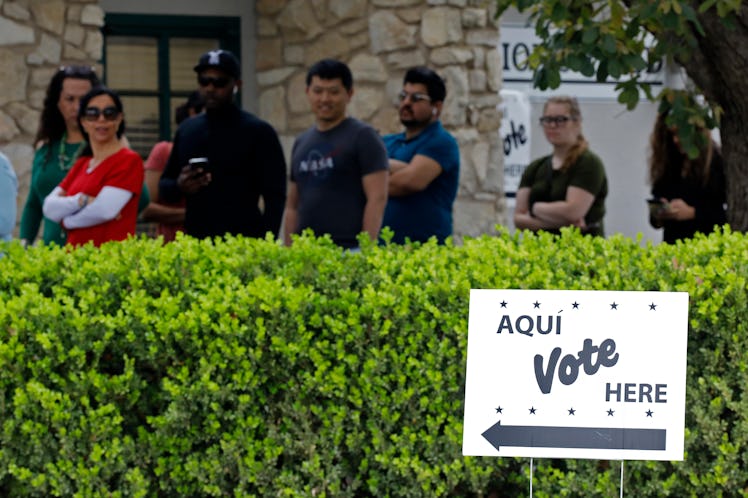
Twitter Pointed Out A Big Problem With Super Tuesday's "Rigged" Primary
On March 3 — Super Tuesday 2020 — the remaining Democratic presidential candidates competed for more than 1,300 delegates as voters in 14 states and American Samoa headed to the polls. There was a lot at stake for the candidates left in the race, as Super Tuesday is often used as a measure of whether a given candidate's campaign is still sustainable. As the results from these primary contests continue to roll in on March 4, however, these tweets about Super Tuesday's "rigged primary" actually point out a big problem: apparent voter suppression.
The morning after Super Tuesday, many disappointed voters turned to Twitter to share the hashtag "#RiggedPrimary" to discuss why their preferred candidate hadn't done better. But others used the hashtag to highlight a very different, and important, problem: just how hard it was for a lot of people to even cast their ballot. In Texas and California, which had the most delegates up for grabs, voters reported experiencing long lines, broken ballot machines, and staffing disruptions that resulted in some people waiting for hours just to vote, USA Today reported. According to Slate, some voters on college campuses and in predominantly Black and Latinx neighborhoods waited in line for two or more hours even after polls across the state closed, prompted renewed allegations of voter suppression. According to Vox, Texas has shuttered approximately 750 polling sites since 2012 — and 542 of those sites were in counties with increasingly Black and Latinx populations.
In California, meanwhile, Los Angeles County ran into some glitches in using its redesigned voter technology, causing wait times of up to three hours in some locations, per Mother Jones. These reports of long wait times and dysfunctional voting technology in key Super Tuesday states prompted Twitter users to demand accountability from lawmakers.
Although some implied that the primary system been set up to favor one candidate or another, voter disenfranchisement — particularly in communities of color — has been a problem in multiple election cycles. In 2018, the Georgia gubernatorial campaign was riddled with accusations of voter suppression after voters were removed from registration lists and polling sites disappeared. During the election, a spokesperson for Sec. of State Brian Kemp — who both oversaw the Board of Elections, and was a candidate in the election — called the claims of voter suppression "bogus" in a statement to Elite Daily. Kemp eventually won the race over opponent Stacey Abrams.
Although reports of long wait times and closed polls prompted confusing about the results of Super Tuesday, the state of the Democratic primary looked much clearer the following day. The primary is shaping up to be a two-way contest between Vermont Sen. Bernie Sanders and former Vice President Joe Biden, who — for the first time in this primary — obtained a delegate lead over Sanders with wins in Massachusetts, North Carolina, and Virginia. As of March 4, Sanders is projected to win California, the biggest prize of the night, but Biden narrowly won Texas, giving him an edge.
On the eve of Super Tuesday, Biden received endorsements from former South Bend Mayor Pete Buttigieg and Minnesota Sen. Amy Klobuchar, who both ended their campaigns in light of disappointing performances in South Carolina. Biden also received an endorsement from former Texas Rep. Beto O'Rourke, who ended his presidential bid back in November 2019. These endorsements, coupled with his victory in South Carolina, gave Biden a surge on Super Tuesday.
Biden and Sanders were not the only two candidates at play on Super Tuesday, though. Massachusetts Sen. Elizabeth Warren remained in the race, too, despite calls from progressives to join forces with Sanders as Biden consolidated the moderate vote. After a third-place finish in her home state and only a handful of delegates from the other contests, Warren is reportedly assessing whether she should continue her campaign, NBC News reported.
Former New York Mayor and billionaire media mogul Mike Bloomberg entered the fray, too, appearing on the ballot for the first time since launching his presidential campaign. After his shabby performance on Super Tuesday, however, Bloomberg announced he was ending his campaign, and he proceeded to endorse Biden. Surprisingly, Warren is not the only woman left in the race, as Hawaii Rep. Tulsi Gabbard remains in the race as well, despite not having secured one delegate thus far.
The Democratic field narrowed significantly in the days leading up to Super Tuesday, and with so few candidates left in the race, the stakes were higher than ever in the states and territories that voted on March 3. However, renewed allegations of voter suppression, coupled with the fact that California's full results may not be available for weeks, may make it difficult to determine what each candidate's chances are in the days and weeks ahead.